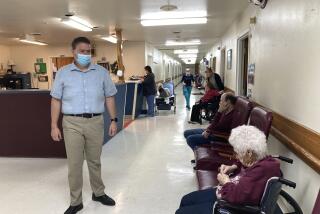Flu vaccine mandates for medical workers
Flu season has officially arrived, and with it the quick prick to the upper arm or a spritz up the nose that comes with the annual vaccine. A few minutes of minor discomfort and you’ll be protected against the three influenza strains most likely to fell you this season. More important, you’ll be preventing the flu’s spread to others for whom the flu is far more dangerous.
So it’s surprising that healthcare workers — the doctors and nurses you trust — have pitiful immunization rates. The Centers for Disease Control and Prevention estimated that only 62% of healthcare professionals received the seasonal flu vaccine between August 2009 and January 2010, and only 35% also received the H1N1 swine flu vaccine. Published scientific studies have suggested that unvaccinated healthcare workers were at least partly responsible for flu outbreaks in a neonatal intensive care unit in Ontario, Canada, in 1998 and a bone marrow transplant unit at Memorial Sloan-Kettering in New York City the same year.
Professional organizations such as the Society for Healthcare Epidemiology of America and the American Academy of Pediatrics support mandatory vaccinations for healthcare workers, including doctors, nurses, students and other hospital employees. The American Nurses Assn., a professional association for registered nurses, rejects such mandates because they vary from hospital to hospital and typically do not allow religious exemptions.
Earlier his year, a cashier at a hospital in Anderson, S.C., filed suit because she believes that the vaccine will make her ill. “Why should I take a medicine that makes me sick?” she told the Greenville News in October. Although some people may experience a mild fever, the CDC says it is not possible to get the flu from the inactivated flu vaccine, and the risk of a severe allergic reaction is extremely rare. Last year, a judge halted a mandate for New York state healthcare workers after workers objected and fought it in court.
The issue is heating up again this fall. Read on for two competing views.
We need mandatory flu vaccinations for all healthcare personnel.
Henry Bernstein is a professor of pediatrics at Dartmouth Medical School and a member of the Committee on Infectious Diseases of the American Academy of Pediatrics.
“Without a mandate, immunization rates have not been as high as they could or should be. Voluntary programs have not been successful enough, so we need to require influenza vaccine to get our immunization rates as close to 100% as we can.
We know thousands of people die every year from influenza-related illness, and 200,000 are hospitalized each year. Flu is spread person to person, which is why we emphasize excellent hand hygiene, cough etiquette and other measures to prevent the spread. But the No. 1 way to prevent the spread is not to get influenza in the first place, hence the universal recommendation that every person 6 months of age or older get vaccinated each year.
There’s no question that vaccination rates are abysmally low among healthcare personnel. Coverage is currently only about 45% to 50% nationally. This is a matter of patient safety. How would you feel if you ended up getting the flu at the hospital or in your doctor’s office and it was determined that you caught the flu from a healthcare worker who had not gotten their influenza vaccine?
I think healthcare personnel have an obligation to get vaccinated — not just to themselves, not just to their families, but to the patients they care for. Many people have conditions such as asthma, heart disease and diabetes that make getting the flu particularly dangerous. Plus, influenza can be prevented by a vaccine.
Unfortunately, voluntary programs are not effective because healthcare workers still have misconceptions about the risks and benefits of the vaccine. It’s true that there is sometimes mismatch between the vaccine and circulating flu strain, but when there is a match, the effectiveness can be as high as 90%.
Here at Dartmouth, we do not have a mandate yet, despite our rates never having exceeded 73%. But we are trying to maximize our vaccination rates by educating everyone in the hospital about influenza and the vaccine to prevent it and by offering a $50 discount on employee health insurance premiums this year. We are shooting for at least 90% coverage in moving toward a more firm requirement for all personnel.”
Mandatory vaccination programs infringe on the rights of healthcare workers.
Nancy Hughes is the director of the Center for Occupational and Environmental Health at the American Nurses Assn.
“I strongly encourage nurses to get a vaccination, but I believe there needs to be an opt-out for those who cannot take it. Whether they have an egg allergy, another medical condition or a religious objection, they should have the opportunity to make their own decision.
It is not clear that vaccination rates are low among nurses. There are a lot of questions about who qualifies as a “healthcare worker” in these surveys. Are they including volunteers? Are they including all the people on the healthcare campus including the cafeteria? We don’t have a handle on that.
I certainly don’t want to see any patients or anyone else die of a vaccine-preventable illness. But the vaccine also gives a false sense of security because there is not a 100% match. There are so many other factors that have not been considered that we feel are just as important.
For instance, some hospitals have policies that if you call in sick on a weekend, then you have to make up your weekend. Or if you call in sick on a holiday, then you lose your holiday. These policies encourage people to come in sick and spread the flu. You want to have policies that have people staying home when they’re sick, washing their hands and generally using good respiratory etiquette.
We have voluntary programs that are working better every year. The president of the American Nurses Assn. sent a letter to nurses to take the vaccine in order to protect co-workers, families and communities. We also recommended using the buddy system — getting the vaccine in pairs — so they can effectively double the vaccination rate. There are still some barriers, and we’d like to see better education efforts and the vaccine to be offered at no charge.
We would be willing to support a mandate if it were done uniformly at a higher level — by the Centers for Disease Control and Prevention — but we cannot support facility-by-facility programs. The problem is that some hospitals have forced nurses who opt out of the vaccine to wear a surgical mask during the flu season or have a dot on their name badge that identifies them. I don’t know what purpose that serves other than intimidation. Nurses should be able to keep their medical information private.”






